What's Happening?
DeepMind has developed QMIX, a state-of-the-art multi-agent deep reinforcement learning model, to address collaboration challenges in Multi-Agent Systems (MAS). The model is particularly applied in the context of open-pit mining, where multiple haul trucks collaborate to optimize routing and scheduling. QMIX operates under the Centralized Training with Decentralized Execution (CTDE) paradigm, allowing global information to be used during training while requiring agents to make decisions based on local observations during execution. The model aims to optimize the 'state-joint action' value function, ensuring that each agent's actions contribute positively to the overall system performance. This approach is contrasted with the Value Decomposition Network (VDN) algorithm, which assumes independent and cumulative contributions from each agent, potentially limiting policy extraction capabilities.
Why It's Important?
The development of QMIX by DeepMind represents a significant advancement in the field of artificial intelligence, particularly in optimizing complex systems like open-pit mining operations. By improving the efficiency of truck scheduling and routing, QMIX can lead to substantial cost savings and increased productivity in the mining industry. The model's ability to enhance decision-making in multi-agent environments could also have broader applications in other industries that rely on complex logistics and coordination, such as transportation and supply chain management. The integration of QMIX with Gaussian Mixture Models (GMM) further refines decision-making by uncovering latent structures in state and action spaces, enhancing the learning process and decision-making capabilities.
What's Next?
The integration of QMIX with GMM is expected to continue evolving, potentially leading to further improvements in multi-agent decision-making systems. As the model is applied to more real-world scenarios, it may undergo refinements to enhance its adaptability and efficiency. Stakeholders in industries reliant on complex logistics may explore the adoption of such AI models to optimize their operations. Additionally, the success of QMIX in open-pit mining could encourage further research and development in applying similar AI technologies to other sectors, potentially transforming how industries approach multi-agent coordination and decision-making.
Beyond the Headlines
The application of QMIX in open-pit mining highlights the growing role of artificial intelligence in transforming traditional industries. The ethical implications of AI-driven decision-making in critical operations, such as mining, need to be considered, particularly in terms of job displacement and the reliance on automated systems. Furthermore, the success of QMIX could spur discussions on the regulatory frameworks needed to govern the use of AI in industrial settings, ensuring that advancements are aligned with societal and environmental goals.









